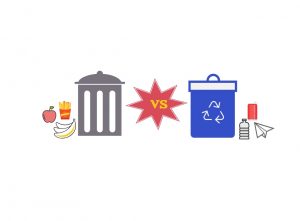Let’s stop glorifying materialism
We will ALWAYS want what we cannot have
May 10, 2019
If you were to wake up tomorrow morning with your world in apocalyptic chaos—and you were posed with one question: what will you take when you escape? What are your “bare necessities?” Imagine those items, and imagine all that you would be leaving behind. So much of what we imagine as our everyday needs are really just nonsensical luxury camouflaged as something we cannot live without.
We all have materialistic dreams, no matter how hard we might try to suppress them in exchange for a grateful, minimalist lifestyle. You might believe that your life would be just that much better if you had the new iPhone, or how you would feel so much prettier with that expensive eyeshadow palette. But in reality, it does not matter how much money you have or the material things you have been showered in: you will always want more.
From the beginning of time, humans have had the tendency to require validation from others in exchange for their own happiness. The theory is, if you have other people looking up to you, than you will have achieved the ultimate appearance and “cool factor.” In reality, however, there will always be someone who appears more successful, richer or cooler than you, no matter what you have.

Modern American teens are notorious for having an obscure view of their “needs.” Technology, clothing brands, cosmetic products and many other luxuries have transformed from delicacies to necessities. Society has continued to reform its standards to require a level of materialism in the lives of citizens, forcing people to be left out without the newest phone, or “cringy” if their appearance fails to match the current style. This consumerism obstructs the views of young people still trying to navigate and learn about the constantly changing world around them.
As the modern market enthralls its buyers, enticing them to keep up to speed with modern trends, it also sets up an unhealthy standard that says that people “need” these products, when in reality, once you attain that product, you will not be satisfied. You will once again be pulled into the miserable cycle of not having enough, and relying on having that next product or material good.
At McCallum in particular, students are less focused on popular mainstream influencers such as the Kardashians or Jenners. On an Macjournalism Instagram poll, 79 percent answered “no” when asked if celebrity endorsements influence their purchasing choices. When I see my peers, however, I cannot help but notice similar expensive brands endorsed by celebrities. Those celebrities may not be as prominent as the Kardashians; however alternative, influencers such as rap artist and designer Tyler the Creator inspire many teens to purchase those mainstream brands.
But is it such a bad thing that teenagers are indulging in similar brands? Surely there will always be brands that dominate fashion and material culture, although I believe it is important to notice when those trends shift into becoming harmful.
“Supreme” is a very popular clothing company among teenagers. With its signature red logo on its products, it has quickly become an important symbol of wealth, and teens “flex” (or show off) their clothes, etc., to one another.
Aside from clothing, the company also produces expensive designs for items as simple as a shovel, or even a crowbar for as much as $400. It is believed that this company’s success is due to its product exclusivity and price, making many of their items not only expensive but scarce. These designs are worn by many artists and model influencers, thus becoming increasingly more appealing to teenagers and young adults alike.
A social influencer can be defined as a person with a significant amount of followers on a social media platform. These people can use their social media account to make revenue from ads, attracting followers, and, in some cases, even be paid by the platform to post consistently.
This idea that we must participate in the buying of items—including those of us who cannot afford to buy multi-hundred dollar clothing items—in order to belong with our peers is a perfect example of why materialism can be fatal to the unity of our community.
Materialism consequentially often ends in a feeling of isolation from your peers and the furthering division of social circles. If you root your identity in the materials you possess, soon you’ll find yourself without an identity and without a strong connection to those you hold close.







